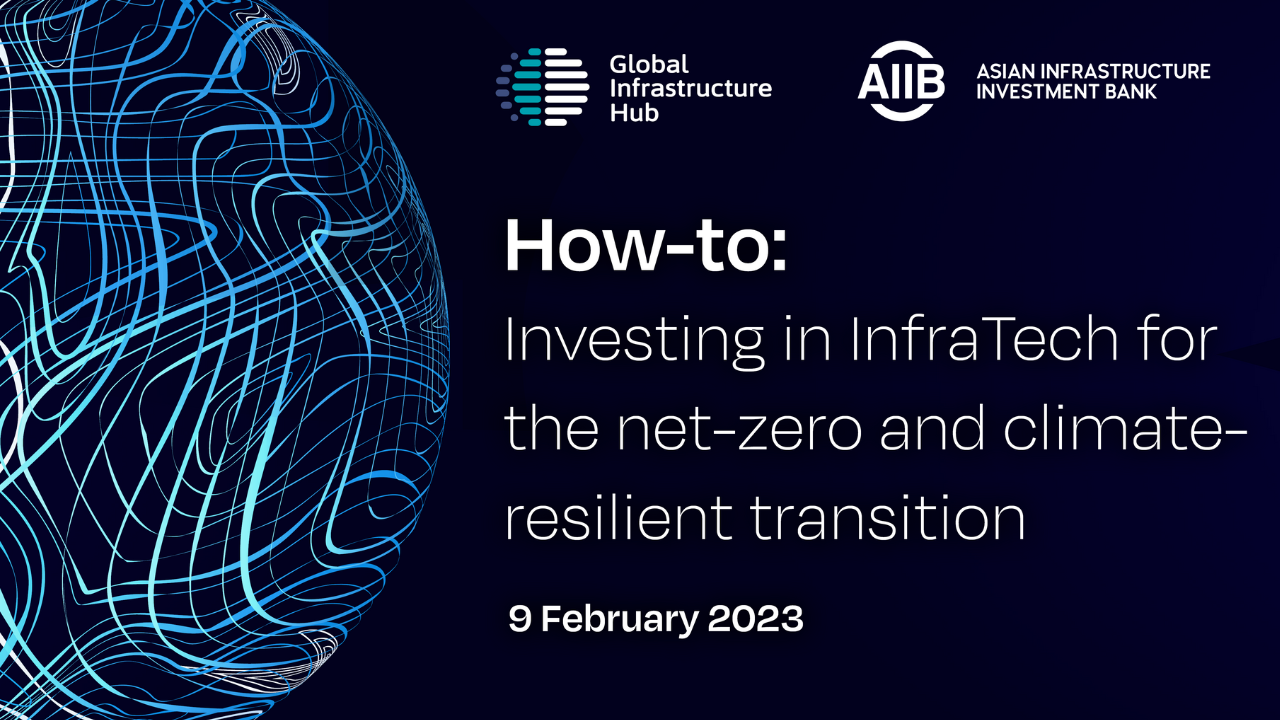961 results found
Featured results



More results
The GI Hub’s InfraTracker aims to help address this data gap by analysing public investment data presented in G20 government budgets

In the world of infrastructure, technological change presents both a challenge and an opportunity. The challenge arises because of the large capital investments which infrastructure projects normally require and the threat that the infrastructure may become obsolete before the investors – whether they are public or private investors – can fully recover their costs. At the same time, there is an opportunity, namely that by using new technologies, we can deliver infrastructure services to the public in a way that is both more efficient and more effectiv
Join the GI Hub and Asian Infrastructure Investment Bank for a webinar that will present the case for investing in infrastructure technology (InfraTech) to support the transition to net zero.
Hyperloop is a form of high-speed transport using passenger 'pods' in low-pressure or vacuum tubes.
The IMF has compiled a suite of analysis, research, diagnostic tools, country reports, data sets, and other resources on the importance of public investment as a catalyst for economic growth.

With a USD3.7 trillion global infrastructure investment need that continues to widen, and government debt levels substantially higher than they were after the global financial crisis, recent infrastructure bond issuances offer valuable lessons.
To increase its global competitiveness, Brazil created an ambitious strategy to attract more private investment in its infrastructure. A partnership with the Global Infrastructure Hub helped Brazil implement and realise this strategy.


Merchant infrastructure, larger investors and the transport sector have experienced larger declines in returns due to COVID-19.


This document provides suggestions on how to address typical challenges faced in the implementation of Facilities Management (FM) through PPPs with a focus on emerging countries with limited experience of the PPP model.


The UNECE International PPP Centre of Excellence has as its core vision the implementation of PPP solutions to promote the United Nations Sustainable Development Goals (SDGs).


Open data is another aspect of digitalisation that is gaining traction. This blog explores the importance of open data to infrastructure delivery and offers some practical steps for decisionmakers in the public and private sector to implement and utilise open data.
The objective of the study is to strengthen capacity of geohazard disaster resilience of federal highway infrastructure in Brazil through reviewing disaster risk management (DRM) capacity for federal road infrastructure and case studies of applying innovative methodologies for assessing disaster risk and evaluating economic benefits of resilience countermeasures.

This note discusses competition and consumer choice in the healthcare sector.

This is a study in 22 low- and middle-income countries in Asia revealing a strong positive relationship between social protection spending and health outcomes.

The COVID-19 pandemic boosted investors’ interest in digital infrastructure and digital services. Policymakers have an opportunity to amplify these effects by accelerating market reforms

Comparison of InfraTracker data with private investment figures in Infrastructure Monitor also indicate that, in general, governments are the driver of investment in all infrastructure sectors except for energy.


This report provides a comprehensive overview of digital transformation in Russia, including chapters on the general digital economy in Russia, the global best practice for enhancing digital platforms in Russa and boosting digital innovation.

The Inclusive Design Standards bring together what LLDC consider the best of existing good practice guidance and consolidate this in a single benchmarking document to be used as a tool by design teams. This second edition of the London Legacy Development Corporation s (LLDC s) Inclusive Design Standards (IDS), originally published in March 2013, is evidence of the positive impact and continued legacy created by the enormous success of the Olympic and Paralympic Games held in London back in the summer of 2012.

This strategy will support and inform the planning applications that will set out the long term vision for the development of sustainable communities within Queen Elizabeth Olympic Park.
The Investor Leadership Network created this playbook to help institutional investors better assess and incorporate inclusion into portfolios. It provides the business case for inclusion, fundamental and advanced inclusion metrics, and case studies of the metrics being used.







 Funding and Financing solutions for Infrastructure
Funding and Financing solutions for Infrastructure



